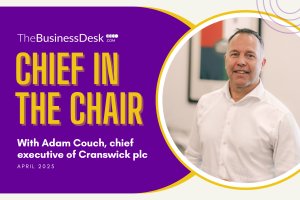“We always talked about using shoe leather”

Walker Morris as Malcolm Simpson, its managing partner describes it, has its office in Leeds but now thanks to the pandemic has people “scattered all over”.
Sitting down with TheBusinessDesk.com the litigation lawyer discussed everything from how the firm approached the pandemic – noting they were in relatively good shape having invested in IT infrastructure and already started what we now call hybrid working – but also transport infrastructure, the challenges facing the legal sector and more.
Simpson started by explained that from its Leeds office Walker Morris works with clients both locally, nationally and internationally and how in days gone by it has required the use of a lot of “shoe leather” to engage clients and get around them; but that all changed with Covid.
“Having only a Leeds office, we’ve always had to work a little bit harder I guess than the firms who have a national spread of offices. Supporting the work of our clients was never a challenge but the physical engagement with them was sometimes more difficult and meant we had to work really hard at it.”
This challenge he says was transformed by the pandemic where the mass adoption of technology meant that instead of considering physical events to engage clients whether in Leeds or London they can now take it online and reach far wider and greater numbers both across the UK, Europe and the US.
In fact, the managing partner said that the pandemic rather than leading to a drop off in engagement with clients actually had the opposite effect, explaining that because everyone was going through the trials and tribulations together people were perhaps engaging more than ever as they sought to understand and adapt to the changes unfolding.
Discussing the engagement of clients leads the conversation to the topic of people. With recruitment and the supply of talent being a big topic of late, the managing partner smiles as he says that the firm has seen opportunities brought about by remote and hybrid working.
One is a colleague who decided in lockdown to move to Denmark to be with his partner but has continued to work for the Leeds-based law firm. The other he said has been seen in recruitment. It’s provided opportunities to widen the pool from which it typically recruits.
Simpson said that “if you’re only commuting two or three days a week” the distance you’re perhaps willing to travel is probably a little greater than if it was every day of every week.
He noted “[The change in working practices is] creating a positive advantage for us because there’s a lot of great firms and great lawyers in Leeds, and there are some in really niche areas where we need to hire talent and perhaps there isn’t anybody in the local market so we need to go further afield.”
The managing partner laughed as he said: “And not everybody wants to live in Leeds, not everybody wants to move to Leeds; whether it’s because it isn’t their part of the world or because they don’t have any family connections here, but now they don’t quite need to move in quite the same way as perhaps they once did.”
He added that the firm has in fact recruited a number of people who are and for the time being have remained in their previous ‘home cities’ which include Birmingham and London
However, despite the opportunities he was more cautious when talking about the challenges which remote working had presented to the next generation of talent.
“Only time will tell won’t it on the impact of lockdowns on the next generation of talent.
“I remember sitting down with a group of new graduates on their first day in January 2021 and saying they are going to have a different experience to some extent than anybody who’s done the training scheme before. But I promised we’d work as hard as they will to make it work and that ultimately, they’ll be strong as a result.”
That sentiment is one which has been shared by the whole of the professional services community, where so many generations have to some degree learnt through osmosis from being around senior figures.
This challenge coupled with what Simpson refers to as a real dearth of talent has created a strange moment where salaries are appearing inflated – it was reported earlier this year that London firms were offering newly qualified lawyers, salaries as high as £156,000 per year.
“I think that’s a quick fix while we have a talent crisis – as plenty of sectors do.”
But the 30 year legal veteran noted he wouldn’t advise anybody to go to start a career at firm offering £156,000 salary as a newly qualified lawyer because “you are cannon fodder”.
He explained the salary isn’t an investment in the individual designed to help them grow and flourish but instead a way to expect them to be billing the equivalent of 15-18 hour days regularly and would be likely to leave anyone “a shell of a person at the end”.
“We as a profession in my mind are getting it wrong at the moment. You can’t expect people to have sustainable careers if you’re driving them to the dust. So how do we respond to that and how is the rest of the profession going to respond?”
He explained for Walker Morris the answer is in trying to find a balance, as he noted no one gets into commercial law for an easy life.
But for Walker Morris to continue to deliver quality work which will require at times some “pretty gruelling hours” Simpson’s clear it has to find a way to provide its people with a chance to “reset every so often”. This opportunity to as he calls it to reset will mean people can have 30-year career as opposed to working three, four or five years and then burning out.
He said the challenge of finding a balance is an ongoing one but that the firm’s first response has been to roll out a sabbatical scheme for all its lawyers, allowing them to work three years and then take a month’s paid sabbatical.
Simpson explained: “That’s not going to make it any easier necessarily, during that three years when you’re working like hell. But you know, it’s something to focus on it’s an opportunity to reset, recharge, and then come back and do another stint.”
Simpson said that such an opportunity can be pretty life changing as he found first hand when one of his predecessors encouraged him to take a break about a decade ago after he’d finished a 12-week trial in London.
“I took a month and switched my phone off for the first – and possibly last time in my working life – and it absolutely was a transformational experience. I took the family to Australia and I came back a different person!”
Moving away from the topic of the pandemic and Walker Morris, the managing partner shared that he was pleased to see West Yorkshire finally achieve devolution with a mayor but he is now looking forward to seeing Levelling Up delivered in a tangible way for Leeds and more widely Yorkshire.
For him part of that crucial investment is a “good, effective fast rail link across the Pennines”.
He explains connectivity is the key to attracting investment and how he’s worked with businesses in the US who when looking at setting up manufacturing facilities in the UK, looked to the North and “invariably went to the North West because of the transport links.
So for Simpson at the very least he’d like to see improved East-West connectivity.
“At the very least, if we do nothing else, let’s put that fast rail link in to Manchester.”
On the topic of transport infrastructure he said he was disappointed by the government’s lack of commitment to the HS2 Eastern leg noting the decision to cancel it seemed to be “exactly the opposite of the Levelling Up agenda we were promised” but added he “was never wholly convinced that it was necessary or the best way to use that investment in this part of the world.”
However, the lack of HS2 he explained isn’t hampering Leeds’ ambitions as he spoke about working closely with the city council to highlight the strength of the legal sector – the city is the second largest legal centre in the UK – and to attract legal tech businesses and start-ups which can help grow the regional economy.
Looking ahead Simpson is positive about the future explaining that the firms latest three-year plan, launched in May 2021 at the start of his second period as managing partner, sets out the ambition to grow to a £70m business by the end of 2024, having in 2021 achieved £55m turnover.
“It’s not just about growth though, it’s about changing the shape of the business, identifying where the skills gaps are and where markets are developing.”
He explained that the business is looking at areas such as energy and infrastructure, technology and digital as well as its international trade practice where there are “really big opportunities for growth in the coming years”.
As the conversation comes to an end it’s clear that in Simpson’s eyes the future for Walker Morris is bright, having navigated the unprecedented challenges of the pandemic it now has not only ambitious growth plans but a desire to shape both the regional and national legal eco-system through challenging some of the sector trends which are growing.
To find out more about Walker Morris click here and be sure to register to attend the latest webinar from TheBusinessDesk.com in partnership with Walker Morris looking at the importance of partnership agreements which will take place at 10am on 16 February.







